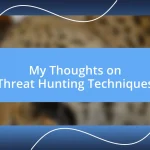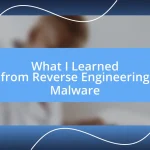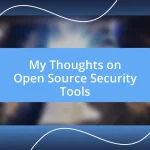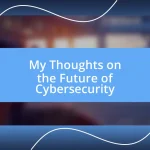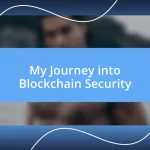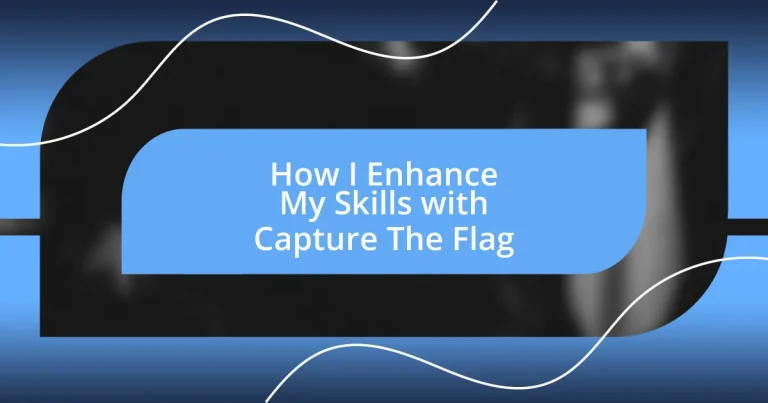Key takeaways:
- CTF competitions enhance problem-solving skills, resilience, and motivation through collaborative and challenging scenarios.
- Choosing the right CTF platform is essential for effective learning, considering factors like challenge variety, community support, and resources.
- Building a CTF community through mentorship and team collaboration significantly enriches the learning experience and fosters knowledge sharing.
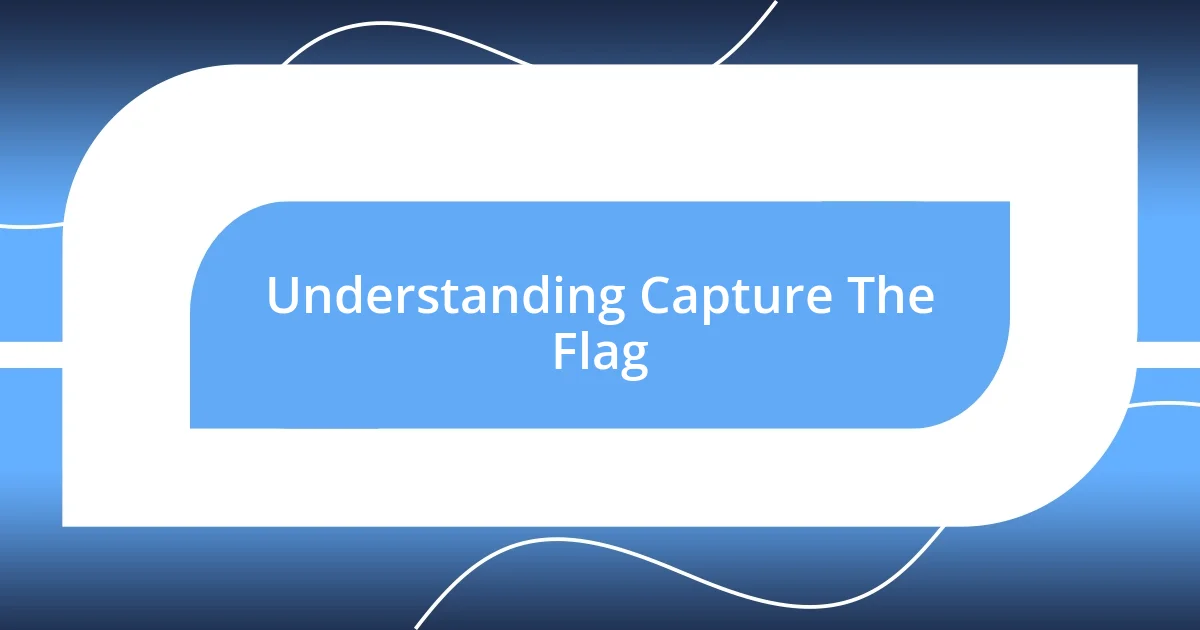
Understanding Capture The Flag
Capture The Flag (CTF) is more than just a game; it’s a dynamic, hands-on experience that sharpens my cybersecurity skills. I remember the first CTF I participated in, feeling a mix of excitement and apprehension as I stared at the challenge list. The thrill of cracking my first code made my heart race—it’s a feeling I can’t quite describe but it solidified my passion for the field.
Each CTF event often consists of various challenges categorized into areas like web security, reverse engineering, cryptography, and forensics. I find that each problem I tackle not only boosts my technical abilities but also enriches my critical thinking. It’s like a puzzle; every piece holds the potential to unlock new knowledge. Have you ever felt that rush when you finally solve a particularly tough challenge? There’s an undeniable thrill in overcoming obstacles that I cherish deeply.
Diving into CTFs has also fostered collaboration, as many challenges require teamwork. I recall the late-night brainstorming sessions with friends, the camaraderie built while bouncing ideas off each other, and the shared joy when we solved a challenge together. Those moments of collective triumph are deeply fulfilling, reinforcing my belief in the power of collaboration in learning. Whether you’re a novice or seasoned expert, that sense of community transforms learning into an exhilarating journey.
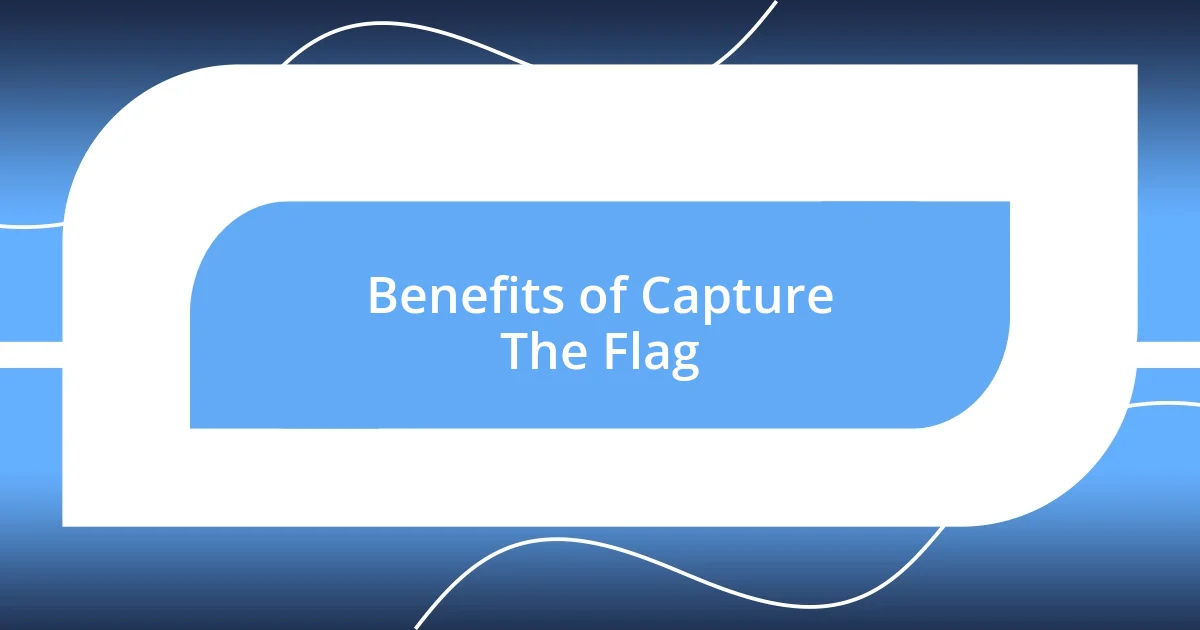
Benefits of Capture The Flag
Engaging in Capture The Flag (CTF) competitions has significantly enhanced my problem-solving abilities. I recall a particular challenge where I had to dissect a misconfigured server — the pressure was on as the clock ticked down. The thrill of piecing together the puzzle sharpened my analytical skills, making me better equipped to tackle real-world scenarios.
The spirit of friendly competition within CTFs has also been incredibly motivating. I remember one night, competing against others from around the world, I felt a rush that kept me glued to the screen. Each point gained not only boosted my score but fueled my determination to push my limits, leading to those breakthrough moments that felt truly rewarding.
Moreover, CTFs have taught me the importance of resilience. I can’t count how many times I faced a challenge that seemed unbearable at first. But with persistence, I learned that failure is just a stepping stone toward success. Surviving those tough moments transformed not only my technical competencies but also my mindset, allowing me to view challenges as opportunities for growth.
| Benefits | Description |
|---|---|
| Problem-Solving Skills | Enhances analytical abilities through complex challenges. |
| Motivation | Encourages competitiveness that drives continuous improvement. |
| Resilience | Teaches persistence in the face of failure. |
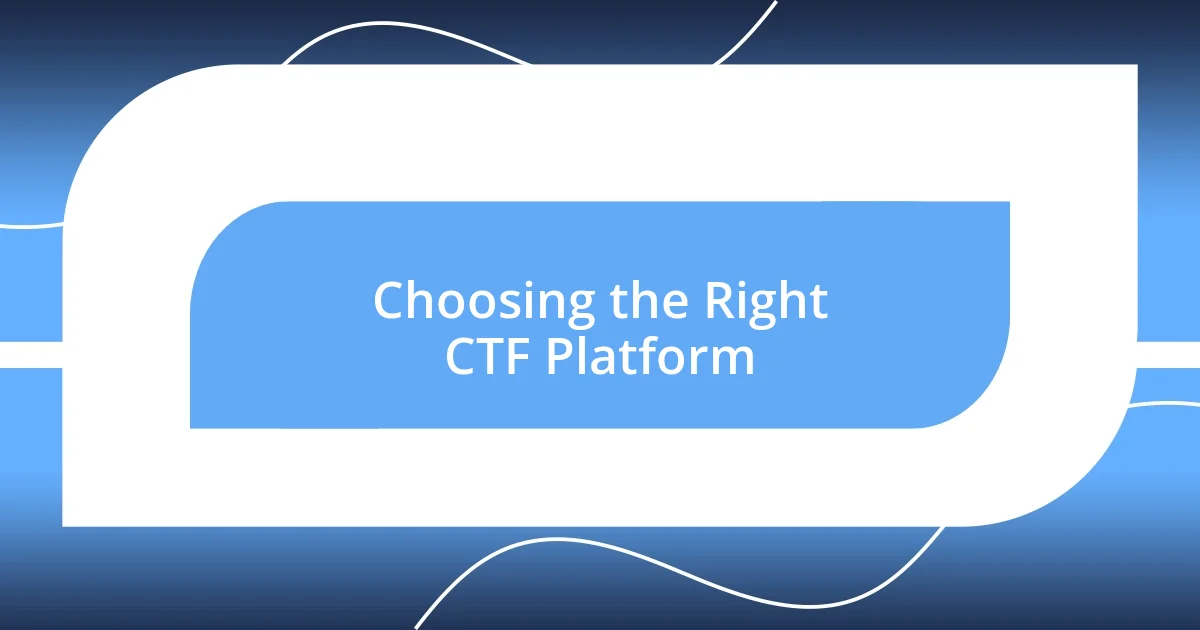
Choosing the Right CTF Platform
Choosing the right CTF platform is crucial for maximizing my learning experience. I’ve found that different platforms cater to various skill levels and challenge types. For example, some sites focus heavily on web vulnerabilities, while others might lean towards cryptography or binary exploitation. It’s important to evaluate what you need most from your practice.
Here are a few factors I consider when selecting a platform:
- Challenge Variety: Does it offer a diverse range of problems from different security domains?
- User Community: Is there an active community for support, camaraderie, and sharing insights?
- Accessibility: Are the challenges easy to access, and can I run them on my local machine or do they require specific setups?
- Tutorials and Resources: Are there guides or walkthroughs available for when I find myself stuck?
- Competition Structure: Does it host regular competitions that maintain a competitive edge while being educational?
On platforms I’ve used, I’ve often wished for more tutorials, especially during moments when I felt overwhelmed by particularly tricky challenges. Those times of struggle had me reaching out to forums and relying on the community, highlighting the importance of a supportive network in my learning process. Each platform brings a unique flavor, but finding the right fit has made a significant difference in how I grow.
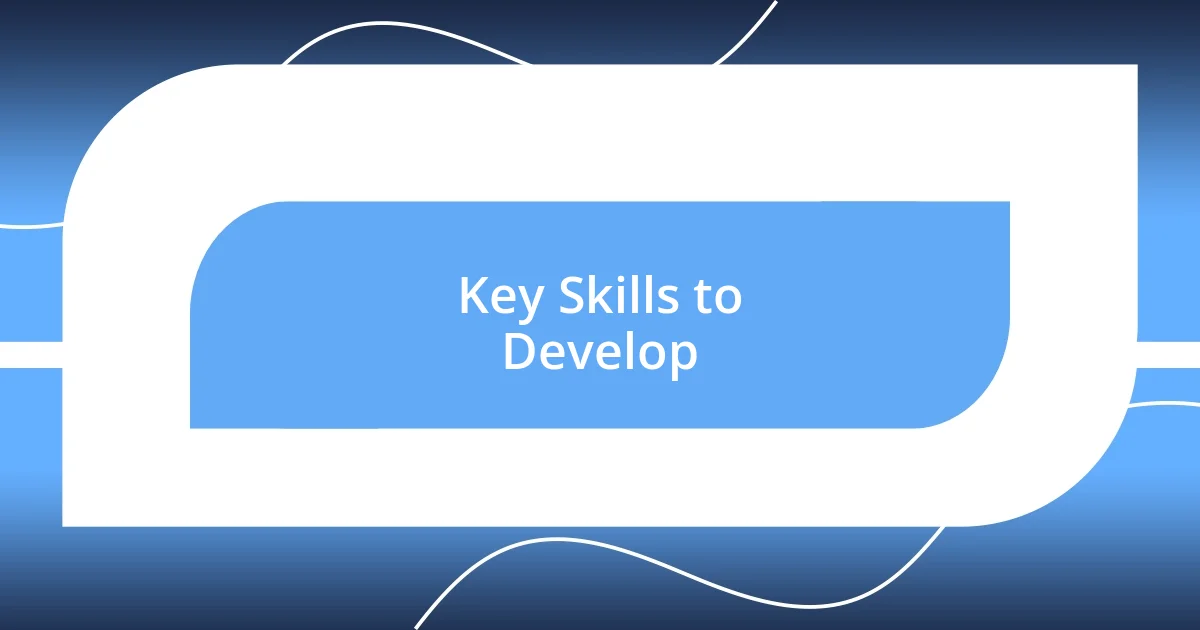
Key Skills to Develop
Capturing the essence of key skills through CTF participation has been quite a journey for me. One essential skill I’ve developed is effective teamwork. During a particularly intense challenge, I partnered with friends online, and we debated strategies, sharing our perspectives in real time. The collaborative nature of CTFs teaches me how diverse approaches can lead to innovative solutions. Have you ever realized that the best solutions come from different viewpoints?
Another vital skill is technical proficiency, especially in cybersecurity tools. When I first started participating in CTFs, I often felt overwhelmed by the sheer number of resources available. However, by dedicating time to hone my understanding of tools like Wireshark or Metasploit, I gradually gained confidence. I remember the rush of successfully exploiting a vulnerability I’d been studying — it felt like unlocking a hidden power within the tech realm.
Lastly, time management emerges as a crucial skill through CTF engagement. I’ve been in competitions where every second counts, and I learned to prioritize tasks on the fly. There were instances when I had to make quick decisions on whether to dive deeper into a challenge or move on to another. Balancing speed with precision has not only improved my efficiency but also taught me the importance of knowing when to pivot. Have you ever faced a ticking clock that pushed you to your limits? Those moments can be stressful but profoundly rewarding when handled well.
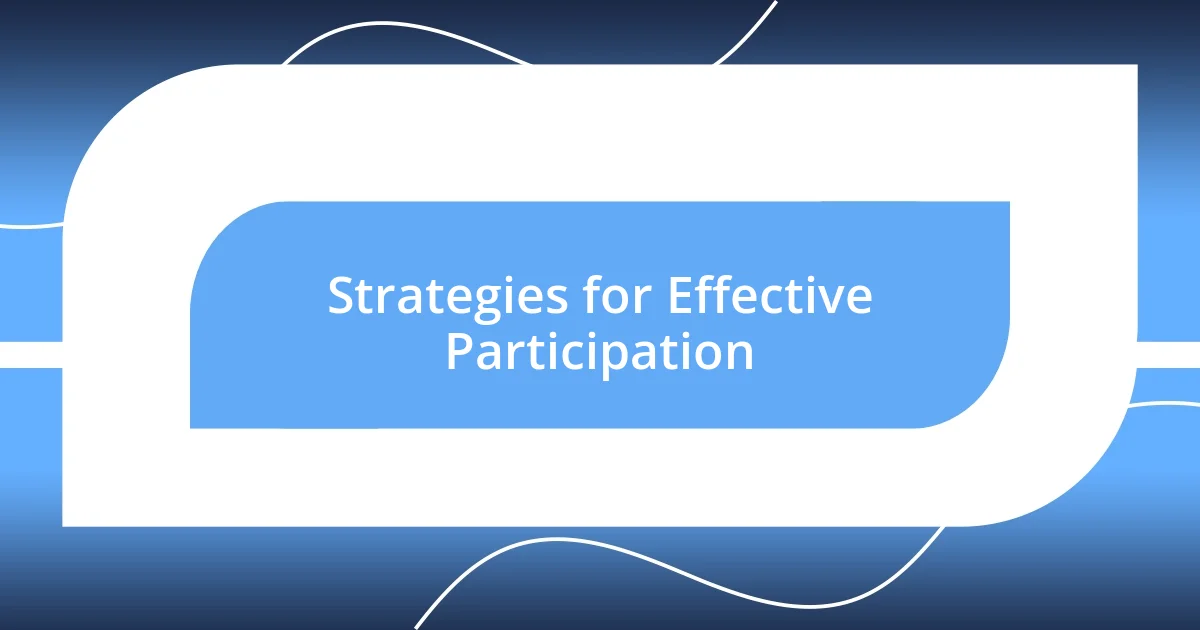
Strategies for Effective Participation
Participating effectively in Capture The Flag competitions requires more than just technical skills. One strategy I find invaluable is to establish clear roles within my team. During one competition, I took on the role of the researcher while my partner acted as the coder. This division of labor allowed us to tackle challenges faster. Have you ever noticed how collaboration can lead to breakthroughs that might be impossible alone? It’s a game-changer.
Another approach I advocate for is maintaining a growth mindset. I don’t just focus on winning; I also reflect on my mistakes after each event. In a recent competition, I misestimated my time on a cryptography puzzle, which ultimately cost us points. Instead of feeling discouraged, I analyzed what went wrong and dedicated time to mastering that specific skill afterward. When you approach each challenge as a learning opportunity, it transforms your experience. Isn’t that a refreshing way to look at setbacks?
Creating a study plan that aligns with the challenges I wish to tackle can also be incredibly effective. I prioritize specific topics based on upcoming competitions or personal interest areas. For instance, I once set aside a week to dive into web vulnerabilities after realizing how often these appeared in CTFs. By the end of that week, I felt significantly more prepared. How do you decide what areas to focus on? Tailoring your study sessions not only keeps things engaging but also enhances your confidence when faced with new challenges.
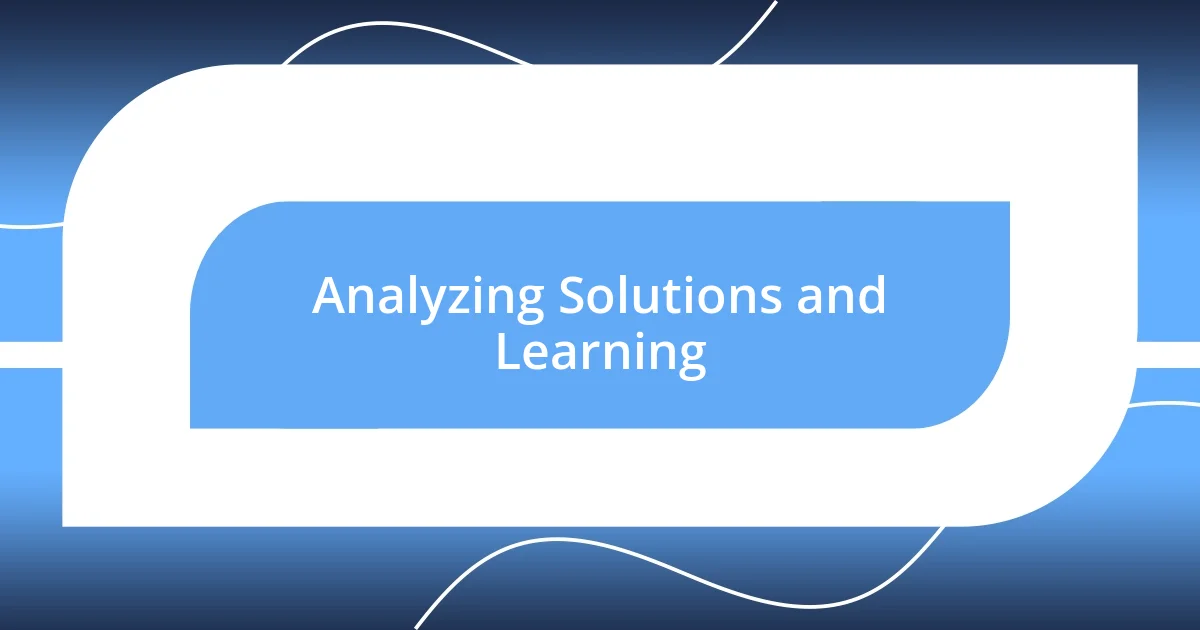
Analyzing Solutions and Learning
Analyzing solutions during and after Capture The Flag competitions is a practice I’ve come to appreciate deeply. When I confront a particularly tough challenge, I’ve made it a habit to deconstruct the problem vividly. Once, during a CTF scenario, I struggled for hours unraveling a network protocol challenge. Instead of just moving on, I decided to document my thought process step-by-step. This not only revealed gaps in my understanding but also illuminated strategies for tackling similar problems in the future. Have you ever dissected a solution only to find hidden insights? It’s like finding buried treasure in a familiar landscape.
Examining what worked in my solutions and what didn’t fosters an ongoing learning cycle. I’ve often sat down post-competition to review my approach thoroughly. Just last week, after a particularly competitive event, I discovered that one of the techniques I overlooked—analyzing logs more comprehensively—could have changed my outcome entirely. Reflecting on these moments feels frustrating yet invigorating; it drives me to explore deeper knowledge areas. How often do we look back at our decisions and determine if there’s a more effective avenue we missed?
I’ve also learned that engaging with the community is paramount in expanding my analysis. After a competition, I often seek out forums or debriefs where participants share their approaches. A memorable instance was when I joined a discussion group online, and someone revealed a clever method to automate a labor-intensive task I had tackled manually. The sense of camaraderie and mutual learning feels enriching. Why not leverage the wisdom of others when it can catalyze our growth? Embracing these collective insights has strengthened my analytical skills, turning previous struggles into stepping stones for future triumphs.
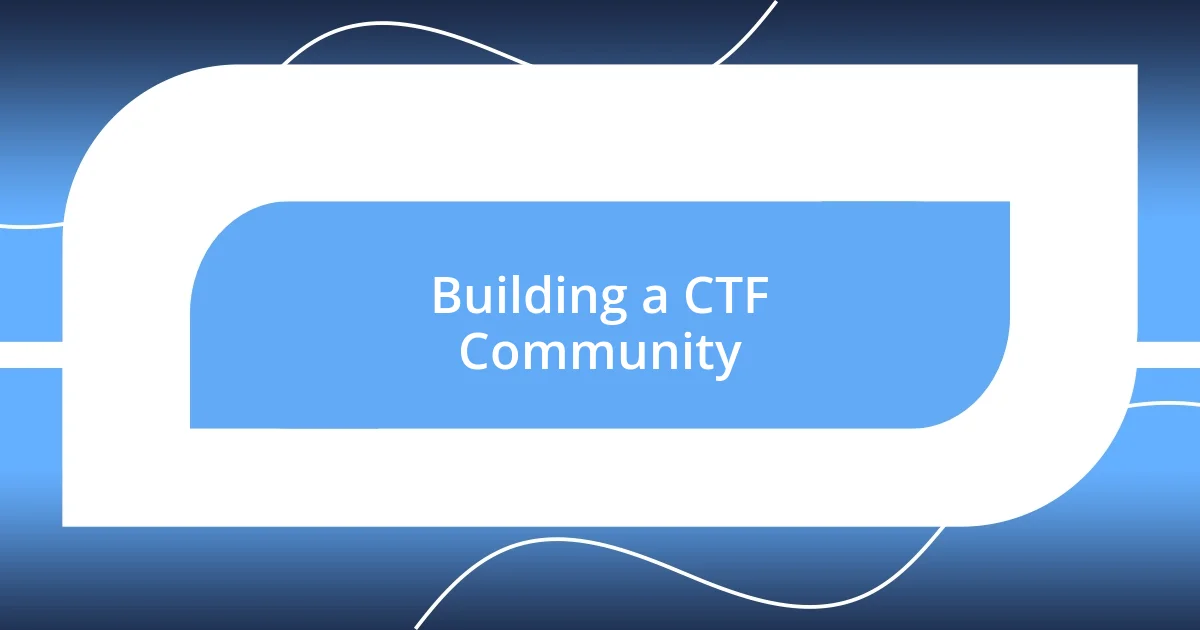
Building a CTF Community
Building a strong CTF community has been one of the most rewarding aspects of my journey. When I first joined a local CTF group, I was struck by how much sharing knowledge can elevate everyone involved. One of my teammates introduced me to a resource that explained complex reverse engineering techniques in a way I could finally grasp. Have you ever felt that rush of clarity when someone shares a valuable tip? It’s like unlocking a door to a room full of new possibilities.
Moreover, I’ve found that organizing meetups can be a game-changer for camaraderie and skill-building. In one of our gatherings, we divided into small teams for a mini-CTF event using challenges from previous competitions. It was exhilarating to see the energy in the room as we brainstormed solutions together, and I loved how the collaborative environment made everyone more confident. Have you tried this approach with your peers? The connections you build and the insights you gain are immense.
Lastly, I can’t stress enough the importance of mentorship within the CTF community. Being both a mentor and a mentee has enriched my experience tremendously. When I mentored a newcomer, it not only solidified my understanding of concepts but also opened my eyes to different perspectives on problem-solving. It’s incredible how teaching someone else can enhance your skills. Isn’t it fascinating how learning is truly a two-way street? Engaging in mentorship allows for personal growth while fostering a supportive network that thrives on shared success.

